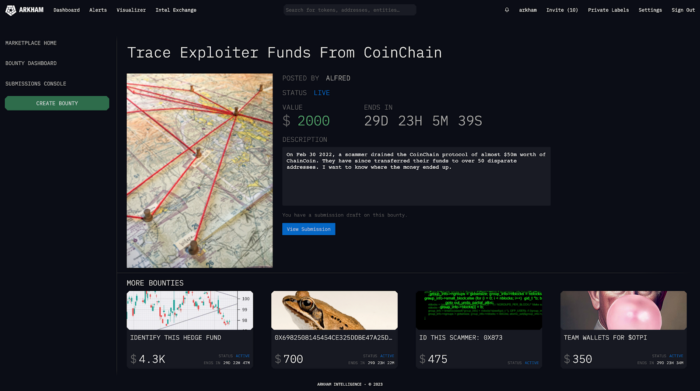The crypto-sphere has been divided as blockchain intelligence firm Arkham has just launched a pioneering new initiative, the Arkham Intel Exchange. The first-ever on-chain intelligence marketplace, Arkham’s unique platform aims to match individuals or entities seeking insights into specific crypto wallet addresses with those capable of procuring it.
Although an undoubtedly powerful potential defense in the fight against scammers in Web3, the system has already garnered both mass support and opposition. As Intel Exchange goes into effect on July 18, many within the blockchain community have been speaking out against the supposed harbinger of centralized doxxing.
The Intel Exchange in a nutshell
The Arkham Intel Exchange emerges from two major trends in on-chain analysis. On the one hand, there’s a rising demand from traders, investors, journalists, and researchers who need detailed analyses of blockchain activity but lack the time or expertise to perform it themselves. On the other, there is an growing pool of skilled on-chain analysts and researchers seeking avenues to monetize their abilities.
Anecdotally, this gap has been filled by Web3 analysis tools such as DappRadar, CryptoSlam, and those created via Dune Analytics, as well as other tracking suites. But Arkham hopes to bridge this widening chasm with the advents available on its new Intel Exchange.
Taking a page out of the contemporary cybersecurity industry, Arkham’s platform allows users to issue a “bounty” for intelligence by locking funds in a contract. These bounties can then be claimed by “bounty hunters” — a.k.a blockchain developers and analysts — who are empowered to offer the requested information in exchange for the staked payment.
To protect its (mostly) uncomplicated system, Arkham imposes a penalty for both spam submissions and low-quality bounty responses.

Notably, the launch of the Intel Exchange comes a week after Arkham introduced its native cryptocurrency, ARKM, to Binance Launchpad on July 11. ARKM is integral to transactions on the Intel platform, as, in place of other crypto tokens, this native currency is used to both put up and receive bounties.
In keeping with the theme of bringing information to light, once a bounty is fulfilled, the party that offered the reward receives exclusive access to the intelligence for a 90-day period, after which the information becomes accessible to Arkham’s wider community.
Users also have the opportunity to contribute to public bounties by matching the original fund lock in order to gain access to the data retrieved by a bounty hunter during the aforementioned holding period, lest they wait three months for others to gain access, of course.
A mixed reception
For its primary use, Arkham has painted its new Intel Exchange as an invaluable tool in, say, locating a hedge fund’s (or Elon Musk’s) crypto wallet addresses, identifying a scammer, or unearthing the true identity behind a bad actor impersonating a high-profile individual. Yet, despite its potential groundbreaking nature, it has stirred a controversy in the NFT space, with mixed reactions appearing across the metaverse.
Some users have lauded the platform’s potential to monetize their research skills, while others have expressed concern over the potential misuse of information, labeling it a “snitch-to-earn” platform. What’s more, Arkham’s tagline, “deanonymizing the blockchain,” doesn’t seem to be helping.
In a bid to assure the safety of transactions on the platform, though, Arkham has stated that all operations on the marketplace will be conducted via smart contracts audited by Web3 security firm Quantstamp. However, it remains to be seen if this concession will be of any solace to critics.
Nevertheless, as the world’s first on-chain intelligence marketplace takes flight, it will be intriguing to observe how the community both uses and reacts to the advent as it evolves over time. Arkham Intel Exchange, in any event, is likely to face a variety of challenges concerning transparency, privacy, and decentralization long before it becomes a viable and go-to intel-to-earn economy.
Editor’s note: This article was written by an nft now staff member in collaboration with OpenAI’s GPT-4.



